Boy, this series is a tough one to puzzle out. I want badly to like it, and some things about it I genuinely do like. There are times when it puts me in mind of Made in Abyss, and others when I think (as I did this week, often) of Shin Sekai Yori – and that’s high praise indeed. But almost in the same moment, Koutetsujou no Kabaneri leapt unbidden into my mind – and a more thoroughly mediocre horror-fantasy you’ll rarely find. And my fear is that’s closer to Kujira no Kora’s true identity.
This is a nice-looking series, no question about it – J.C. Staff is clearly aiming to show off their best work here. And it’s pretty ruthless and unafraid in its storytelling, and not overly reliant on anime tropes. All that is good, obviously. But there’s a broadness to all of this I find off-putting – none of it is remotely subtle. The violence feels, to an extent that it does not in shows like Abyss or SSY, as if it’s here mainly to shock. And the emotional moments seem pretty scripted, even manipulative. I don’t want to feel that way, but I do – and going forward it’s going to present a significant problem.
With all that said, the world-building here is still pretty good. I sense the seed of an interesting premise here – the Mud Whale floating free as an island of unwitting heretics, not realizing an army of believers was out there hunting them down. There was very much a lambs to the slaughter quality to the invasion of the island here, all the more so in that most of the victims were literally lambs in the sense of being children (Sami among them, though to be honest I felt nothing more for her than any of the others). It was only (predictably) Ouni that fought back – and he didn’t hesitate to resort to torture to gain valuable information about the enemy’s plans (to return in a week to finish what they could easily have finished then and there – for, you know, reasons).
Something else is going on here, interesting for sure, and a bit unnerving. As soon as I heard Suou make reference to the “Self-Defense Forces”, the inescapable leap of thought was that Kujira no Kora is casting itself as a metaphor for postwar Japan. That’s a train of thought with a lot of track to run on – Japan has been an isolationist country for most of its history, afraid of the influence of the wider world. Its postwar constitution is self-defined as “pacifist”, and a nationalist leader is currently pushing to “revise” it. It’s not hard to see the Mud Whale, dooming itself with a refusal to confront reality and defend itself, as a stand-in for modern Japan.
As with much about Kujira no Kora, I find myself torn on that point. On the one hand I’d like to think something deeper is going on here – whether I’m giving the series too much credit I don’t know. But on the other, if indeed this is what mangaka Umeda Abi is going for, this is a dangerous path. There seemed to be a lot of sympathy for Ouni’s decision to torture and murder his prisoners, and disdain for anyone who disagreed with him – indeed, a general contempt for pacifism generally. And hey, I get that Ouni was the only one fighting back when his people were dying – but the world is not that black and white, and what nationalists and xenophobes do is portray shaded situations in black and white in order to justify their views and inflame the hatred in others.
Again – I’m not saying that’s what’s happening in Kujira no Kora wa Sajou ni Utau, but it does seem to be one possibility. And it would at least be something deeper than the generally superficial if modestly effectively plot and characterization we’ve seen so far. I see a few potential outcomes for Kujira no Kora, and honestly most of them aren’t favorable from my perspective – but we’ll wait and see. Ultimately it comes down to one simple fact – this show is going to be only as good as its writing, and so far the jury is out on how far that writing is going to be able to carry it.


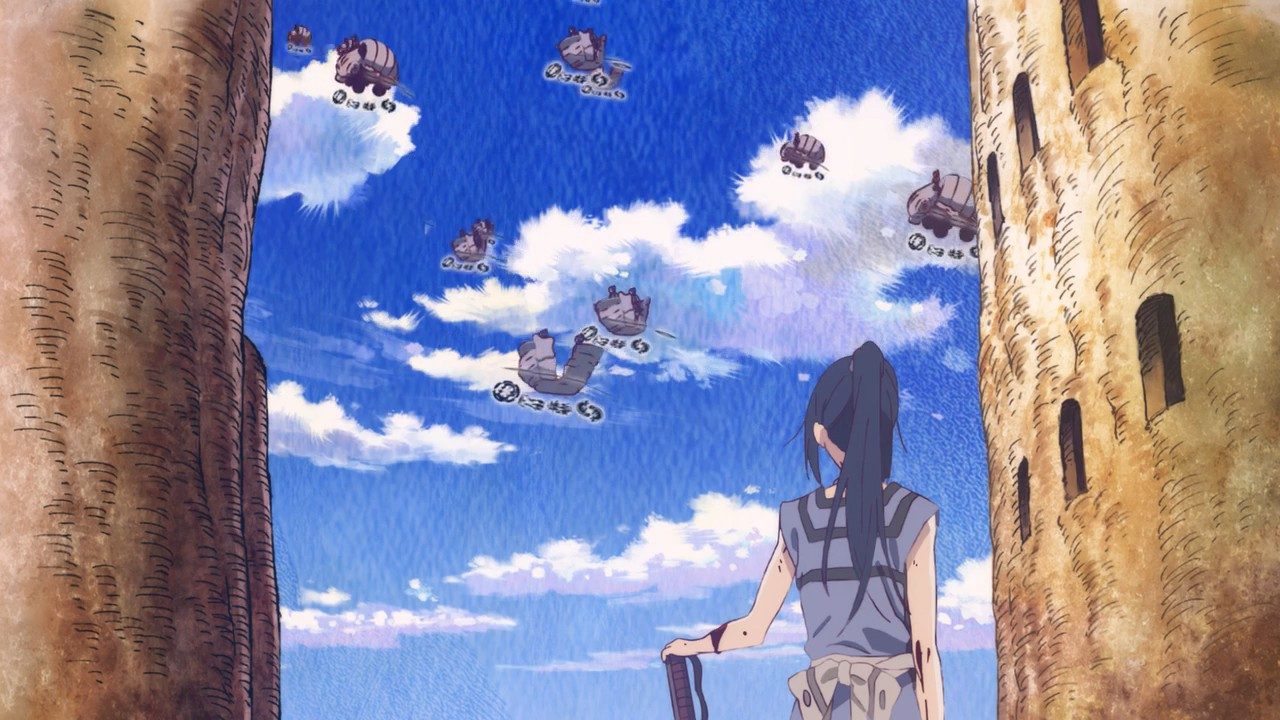


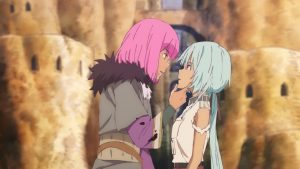

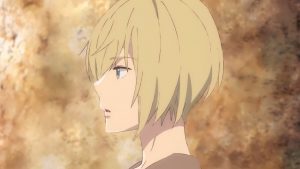
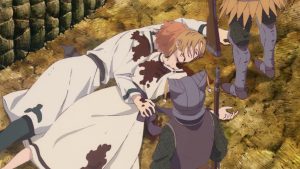


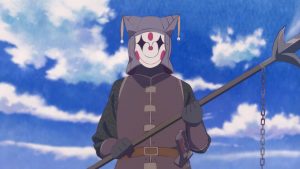
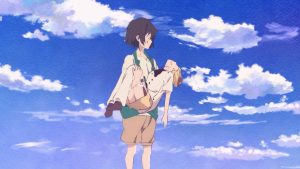

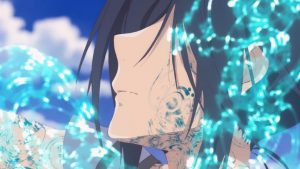
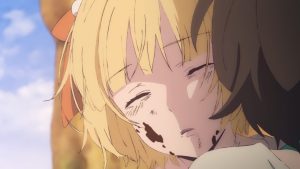
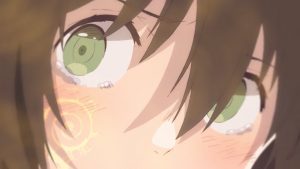
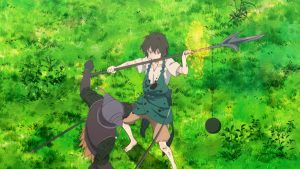

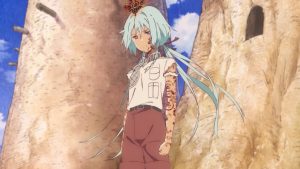
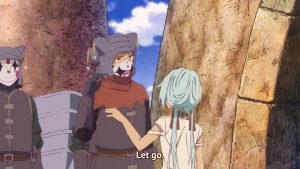

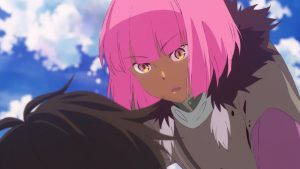
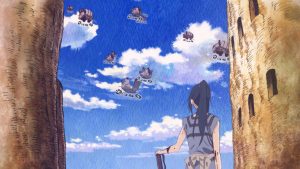

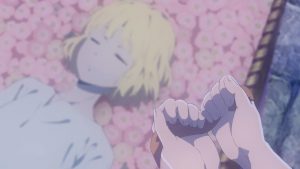

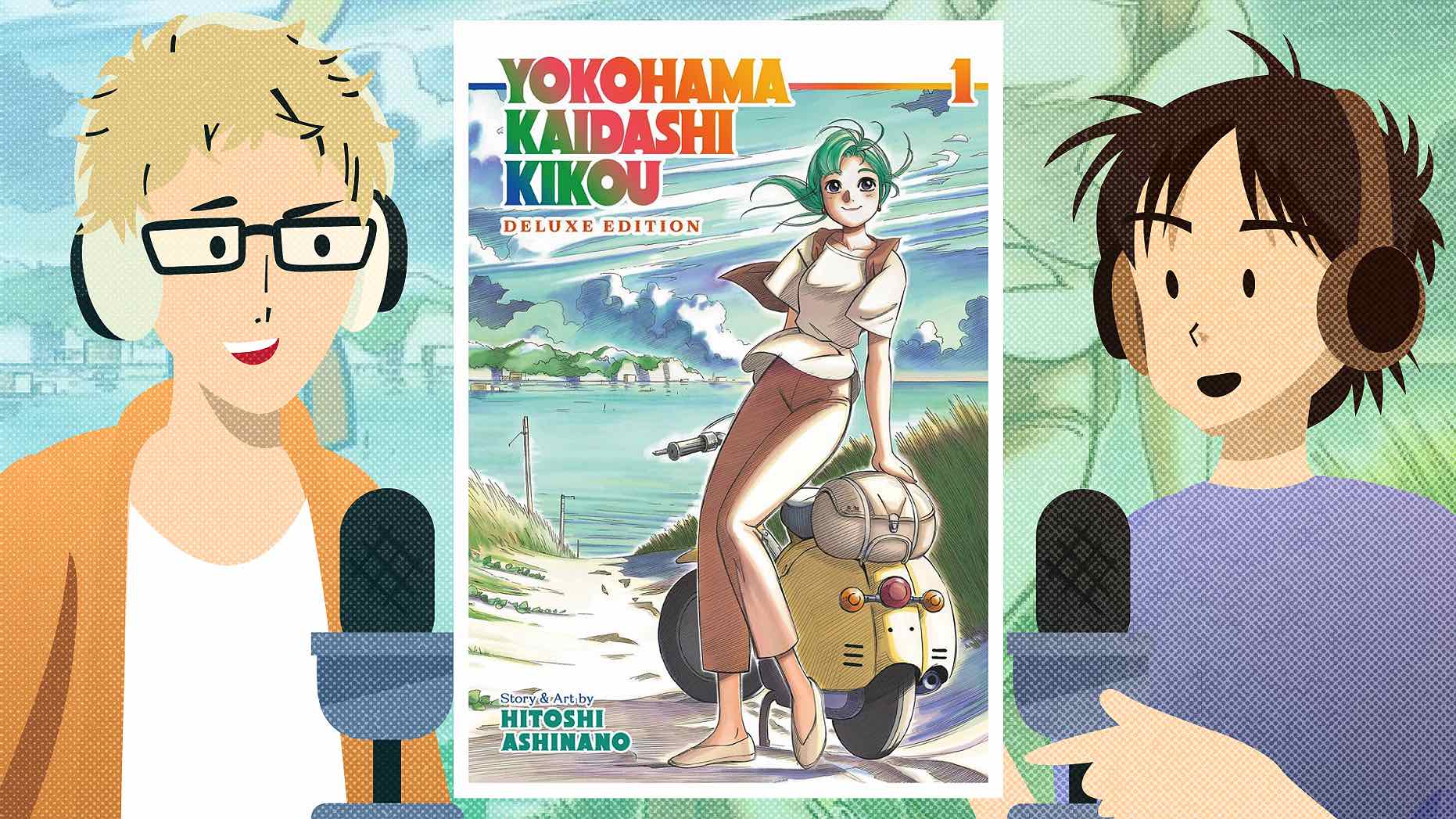
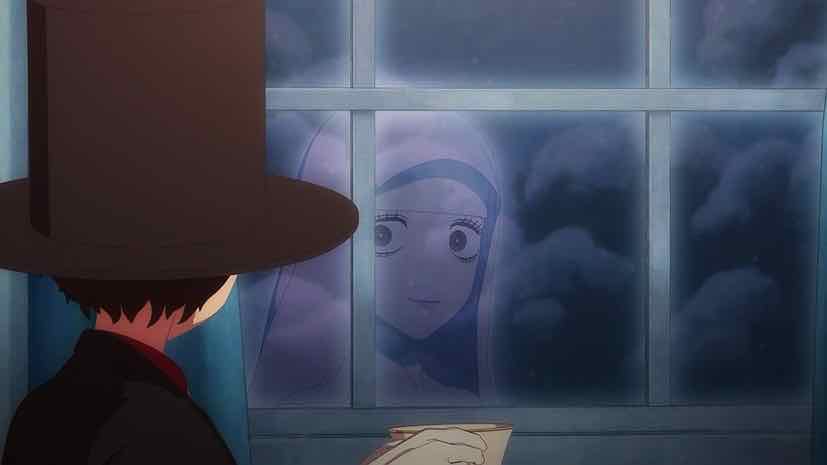
Water Imp
October 24, 2017 at 4:48 amIn a sandy world of tropes, Pink Hair is giving me psychopath shota Valvrave vibes. It;d probably help if it went the Valvrave route, but there’s propriety and all that. On the positive, I really like the backgrounds and their airships briefly superimpose a feeling from Noein.
Also, an obligatory “It’s not Zura, it’s Katsura!”
Guardian Enzo
October 24, 2017 at 7:22 amI did not find that character to be a rewarding diversion. But on the plus side I guess it’ll be interesting to hear Yamashita Daiki play a psycho.
Water Imp
October 24, 2017 at 4:14 pmFor me, the trope of the anime psychotic is cringeworthy/nails on chalkboard. But the show in generally is opting for lazy shorthand. Its naif is definitely not Kekkai Sensen’s naif. Probably an unfair/unreasonable comparison.
CP93
October 29, 2017 at 6:52 amAlso: psychopath in a community that has supposedly gotten rid of emotion? Plot hole much?
justfun
October 24, 2017 at 10:10 amThanks for the reference to contemporary politics in Japan! Although I was wondering about all the anti-pacifist comments on MAL on this episode and the apologetic stance to torture, I was not able to draw the line.
Seems I was too busy being disappointed about the series and stopping myself from dropping it. After a great first episode and a second episode that had its problems, this one was just unbearable. You don’t need too much realism in anime, but the course of the attack on the Sand Whale was just incomprehensible and made me question the attacking army being an actual army. The appearing murderous psychopath and the plotting big brother were just two more missing parts of the “Anime Character Cast for Dummies” course. And the indication of a bigger plot makes me afraid that the show is overreaching for its short length and that it will just try to copy similar shows as Last Exile.
Molly
October 25, 2017 at 10:16 amI don’t think this reads as a nationalistic screed in subtext. Of course, everyone’s entitled to its own reading but I thought the show wasn’t all that black and white about Ouni’s actions, as far as support for his actions vs. disdain for his detractors went.
While there’s no doubt that he was acting in self-defense, he’s explicitly portrayed as a monster, no better than his attackers, committing a capital sin. In this regard Suou’s reaction to Ouni’s actions is telling.
As for the dreaded SDF, they were basically useless during the entire attack. Maybe they had been originally set up as a SDF, but given all the damnatio memoriae surrounding the whale ship, they clearly weren’t self-defending anything as far as I could tell.
Guardian Enzo
October 25, 2017 at 11:45 amI think the uselessness of the “SDF” points towards the idea that we could be going nationalist if anything, TBH. As in, a symptom of what pacifism does to make a country helpless.
I don’t know that I agree that Ouni was portrayed as a monster here, but we’ll see how it plays out.
Molly
October 26, 2017 at 3:24 amOn one hand, I agree with the first part of the reply. Wanted to write something similar in my post about nationalism and militarization but again I don’t agree with this interpretation about this series. The idea of “nationalism masquerading as pacifism” just feels too forced upon especially considering the available material. If so, where the series is concerned, the uselessness of the SDF would play as an indictment of the nationalist idea and not as a gateway for more nationalism.
On the other hand, I’m not sure that I understood the inference you make where pacifism is concerned. Are you saying that the apparent helplessness of a pacifist society is derided by nationalists?
If we forego this subtext, the material can very well be read as what happens to a population that is under threat of genocide /ethnic cleansing. Which is another thing that is plaguing the world.
As far as Ouni is concerned, I might be confusing the anime with the manga but in the respective chapter, the children were horrified of his actions, calling him a monster and Suou was lamenting about a world of monsters and demons, musing that such a world would be hell.
Guardian Enzo
October 26, 2017 at 8:22 amI haven’t read the manga so can’t compare, but that’s absolutely not the way Ouni came off in the anime as far as I’m concerned.
It seems a very realistic (I would argue even the most likely) interpretation to me to say that the SDF being useless against a real enemy is a metaphor for Japan’s SDF being a naive and insufficient means to assure the country’s safety in a dangerous world full of enemies.
I’m not saying the series is definitely going in a pro-nationalism direction, but it’s one possibility.
Fall 2017 rules
October 26, 2017 at 11:22 amI love this show wholeheartedly. I’m sorry.
Guardian Enzo
October 26, 2017 at 1:11 pmNo need to be sorry.
Arlaide
October 26, 2017 at 3:39 pmI did not recognize the “Whale” being a parable for after-war Japan, but then I also missed the SDF bit while watching the episode. For me it was just the well-known refutation of pacifism in the face of abysmal evil then. Imho you got a point there.
However, another currently omnipresent set of memes was abundant in this episode – terror. We got faceless paramilitary units raiding a peaceful village and kill peaceful inhabitants indifferently. All this happens without them even asking, whether their religiously(!) motivated assumptions about the “the subhumans” hold true in any sense. Of course, the terrorists also reveal darker skin, when their helmets falls of their heads…
And then, the psychopath. This is no Bondrewd, who for all his cruelness has logically justifiable reasons for his doings. This is a psychopath, who has risen in the pyramid of power and now indulges in his sadistic tendencies. This guy is as evil and inhuman as modern terrorist super-cells, whose main acchievment these days seems to be the ackowledgment of torture as a peacekeeping tool in western societies…
This is indeed dangerous territory.
Ronbb
October 27, 2017 at 11:19 pmThis is a good writeup, Enzo! And being late to leave a comment allows me to read the many thoughts provoked by your review. I like this series a lot, but had not truly understood why. Your review made me realize why I am fascinated by this show — it’s the abundant possibilities. Of course, like you said, the writing in the upcoming episodes will truly tell its strength…what kind of a message it’s trying to convey and how it conveys it. I’m not a manga reader, and can only imagine.
I liked the dialogue in previous episodes — not so much in this week’s — and it added depth to the world-buildng. We don’t have enough time to build a connection with Sami, but watching how Chakoro carried her dead body around and regretted the conversation the night before made it feel sad. Sometimes without knowing it we might lose the chance to reconcile, and can only hold on to the regrets… It’s also very terrifying to watch how one race can just massacre the other. I made me think of the Holocaust — which I will never truly understand the horror and pain — and ask where humanity lies.
Whatever the future holds, I’m sticking with this show…love to continue reading your reviews…
P.S. Yes, I’m looking forward to reading your check-in…no pressure, no pressure…